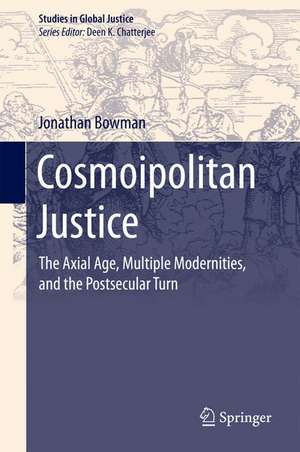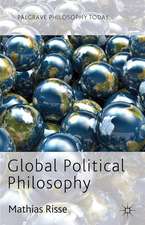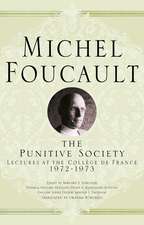Cosmoipolitan Justice: The Axial Age, Multiple Modernities, and the Postsecular Turn: Studies in Global Justice, cartea 15
Autor Jonathan Bowmanen Limba Engleză Hardback – 23 ian 2015
In Jon Bowman's novel and important work, he rethinks the challenges of global justice. Bowman is not just concerned with global justice in the modern world, but with a genealogy that begins with a better understanding of the Axial age, one that is also the unique signature of cosmoi-political institutions. Arguing with depth and precision, Bowman challenges Kantian and Rawlsian universalism. His argument provides a new interpretation of cosmopolitan justice ashe explores the deeper roots of cosmopolitan justice.
James Bohman
Saint Louis University
Jon Bowman’s Cosmoipolitan Justice is an important, innovative and timely work. Construing globality in terms of pervasive conditions of worldwide interdependence, Bowman advances a decidedly pluralistic account of cosmopolitanism, one uniquely shaped by recent theories of multiple modernities. His analysis is sustained by a highly informed appropriation of such diverse thinkers as Theodor Adorno, Abudullah An-Naim, Talad Asad, Schmuel Eisenstadt, Jürgen Habermas, Karl Jaspers, John Rawls, Amartya Sen, and Charles Taylor. One special feature is the book’s synthesis of research on global governance with that on post-secularity and the place of religion in the public sphere. On this basis Bowman presents a distinctive account of the world’s axial religions, one underwriting a multi-polar, intercultural global public realm able to address social, political, andeconomic issues confronting the global community today. This book should be of great interest to students and scholars in philosophy, political theory, international relations, sociology, and religious studies.
Professor Andrew Buchwalter
Department of Philosophy
University of North Florida
| Toate formatele și edițiile | Preț | Express |
|---|---|---|
| Paperback (1) | 641.85 lei 6-8 săpt. | |
| Springer International Publishing – 7 dec 2015 | 641.85 lei 6-8 săpt. | |
| Hardback (1) | 648.24 lei 6-8 săpt. | |
| Springer International Publishing – 23 ian 2015 | 648.24 lei 6-8 săpt. |
Din seria Studies in Global Justice
-
 Preț: 212.66 lei
Preț: 212.66 lei - 18%
 Preț: 1222.49 lei
Preț: 1222.49 lei - 18%
 Preț: 942.44 lei
Preț: 942.44 lei - 15%
 Preț: 639.73 lei
Preț: 639.73 lei - 15%
 Preț: 636.80 lei
Preț: 636.80 lei - 18%
 Preț: 892.74 lei
Preț: 892.74 lei -
 Preț: 354.54 lei
Preț: 354.54 lei -
 Preț: 446.47 lei
Preț: 446.47 lei - 15%
 Preț: 641.71 lei
Preț: 641.71 lei - 18%
 Preț: 731.91 lei
Preț: 731.91 lei - 15%
 Preț: 587.72 lei
Preț: 587.72 lei - 18%
 Preț: 945.47 lei
Preț: 945.47 lei - 24%
 Preț: 626.01 lei
Preț: 626.01 lei - 18%
 Preț: 892.28 lei
Preț: 892.28 lei - 18%
 Preț: 948.92 lei
Preț: 948.92 lei - 15%
 Preț: 641.03 lei
Preț: 641.03 lei - 15%
 Preț: 637.13 lei
Preț: 637.13 lei - 15%
 Preț: 638.57 lei
Preț: 638.57 lei - 15%
 Preț: 635.96 lei
Preț: 635.96 lei - 18%
 Preț: 947.50 lei
Preț: 947.50 lei - 15%
 Preț: 639.25 lei
Preț: 639.25 lei
Preț: 648.24 lei
Preț vechi: 762.64 lei
-15% Nou
Puncte Express: 972
Preț estimativ în valută:
124.04€ • 129.86$ • 102.64£
124.04€ • 129.86$ • 102.64£
Carte tipărită la comandă
Livrare economică 05-19 aprilie
Preluare comenzi: 021 569.72.76
Specificații
ISBN-13: 9783319127088
ISBN-10: 331912708X
Pagini: 335
Ilustrații: X, 315 p.
Dimensiuni: 155 x 235 x 25 mm
Greutate: 0.64 kg
Ediția:2015
Editura: Springer International Publishing
Colecția Springer
Seria Studies in Global Justice
Locul publicării:Cham, Switzerland
ISBN-10: 331912708X
Pagini: 335
Ilustrații: X, 315 p.
Dimensiuni: 155 x 235 x 25 mm
Greutate: 0.64 kg
Ediția:2015
Editura: Springer International Publishing
Colecția Springer
Seria Studies in Global Justice
Locul publicării:Cham, Switzerland
Public țintă
ResearchCuprins
Acknowledgements.- Chapter 1 Introduction—Why Cosmoipolitan Justice? Species-Ethics and the Competing Ecumene of the Axial Age.- Part I: Axial Period One—the Great World Religions.- Chapter 2 Extending the Dialectics of Secularization Eastward: Scriptural Hermeneutics and Discursive Insights from Hindu, Buddhist, Confucian, and Taoist Philosophy of Language.- Chapter 3 Jasper’s Axial Prophesy Fulfilled? The Origin and Return of Biblical Religion, Abrahamic Hermeneutics, and the Second Person.- Part II: Axial Period Two—Multiple Modernities.- Chapter 4 Whose Justice? Which Modernity? Taylor and Habermas on European versus American Exceptionalism.- Chapter 5 The Fiction of a European Secular Modernity: Rationalists, Romantics, and Multiple Modernists.- Part III: Axial Period Three—the Postsecular Turn.- Chapter 6 Conclusion—Western vs. Eastern Replies to the Inverse Economic Pyramid: Innovation, Development, and the Material Future of Cosmoipolitan Justice.- Index.
Textul de pe ultima copertă
This book assesses the rapid transformation of the political agency of religious groups within transnational civil society under conditions of globalization weakening sovereign nation-states. It offers a synthesis of the resurgence of Jasper’s axial thesis from distinct lines of research initiated by Eisenstadt, Habermas, Taylor, Bellah, and others. It explores the concept of cosmoipolitanism from the combined perspectives of sociology of religion, critical theory, secularization theory, and evolutionary cultural anthropology. At the theoretical level, cosmoipolitanism prescribes how local, national, transnational, global, and virtual spaces ought publically to engage in transcivilizational discourse without presuming the secular assumptions tied to cosmopolitanism. Employing insights of critical theory, this book offers a micro-level analysis of the pragmatics of discourse of each axial tradition contributing to the role of religion within multiple modernities. While circumscribingthe particular historical limits of each tradition, the book extends their internal claims to species universality in light of the potential for boundless communication Jaspers saw initiated with the Axial Age.
In Jon Bowman's novel and important work, he rethinks the challenges of global justice. Bowman is not just concerned with global justice in the modern world, but with a genealogy that begins with a better understanding of the Axial age, one that is also the unique signature of cosmoi-political institutions. Arguing with depth and precision, Bowman challenges Kantian and Rawlsian universalism. His argument provides a new interpretation of cosmopolitan justice as he explores the deeper roots of cosmopolitan justice.
James Bohman
Saint Louis University
Jon Bowman’s Cosmoipolitan Justice is an important, innovative and timely work. Construing globality in terms of pervasive conditions of worldwide interdependence, Bowman advances a decidedly pluralistic account of cosmopolitanism, one uniquely shaped by recent theories of multiple modernities. His analysis is sustained by a highly informed appropriation of such diverse thinkers as Theodor Adorno, Abudullah An-Naim, Talad Asad, Schmuel Eisenstadt, Jürgen Habermas, Karl Jaspers, John Rawls, Amartya Sen, and Charles Taylor. One special feature is the book’s synthesis of research on global governance with that on post-secularity and the place of religion in the public sphere. On this basis Bowman presents a distinctive account of the world’s axial religions, one underwriting a multi-polar, intercultural global public realm able to address social, political, and economic issues confronting the global community today. This book should be of great interest to students and scholars in philosophy, political theory, international relations, sociology, and religious studies.
Professor Andrew Buchwalter
Department of Philosophy
University of North Florida
In Jon Bowman's novel and important work, he rethinks the challenges of global justice. Bowman is not just concerned with global justice in the modern world, but with a genealogy that begins with a better understanding of the Axial age, one that is also the unique signature of cosmoi-political institutions. Arguing with depth and precision, Bowman challenges Kantian and Rawlsian universalism. His argument provides a new interpretation of cosmopolitan justice as he explores the deeper roots of cosmopolitan justice.
James Bohman
Saint Louis University
Jon Bowman’s Cosmoipolitan Justice is an important, innovative and timely work. Construing globality in terms of pervasive conditions of worldwide interdependence, Bowman advances a decidedly pluralistic account of cosmopolitanism, one uniquely shaped by recent theories of multiple modernities. His analysis is sustained by a highly informed appropriation of such diverse thinkers as Theodor Adorno, Abudullah An-Naim, Talad Asad, Schmuel Eisenstadt, Jürgen Habermas, Karl Jaspers, John Rawls, Amartya Sen, and Charles Taylor. One special feature is the book’s synthesis of research on global governance with that on post-secularity and the place of religion in the public sphere. On this basis Bowman presents a distinctive account of the world’s axial religions, one underwriting a multi-polar, intercultural global public realm able to address social, political, and economic issues confronting the global community today. This book should be of great interest to students and scholars in philosophy, political theory, international relations, sociology, and religious studies.
Professor Andrew Buchwalter
Department of Philosophy
University of North Florida
Caracteristici
Engages secularization theory in an inter-disciplinary style that utilizes the rich resources of the critical theory tradition Discloses the insights of the great axial traditions via a hermeneutic analysis on their own terms Executes a balanced approach to global material injustice from both Western and non-Western perspectives Includes supplementary material: sn.pub/extras










